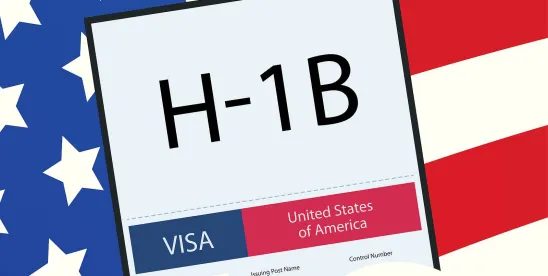It is that time of the year again – H-1B CAP registration is right around the corner. With the continued beneficiary-centric selection process, and the new H-1B modernization rule which impacts H-1B CAP filings, employers should prepare now.
H-1B CAP Registration
Employers with candidates who require initial H-1B employment authorization should plan to submit a registration for those candidates when the H-1B electronic registration period opens on March 7, 2025. FY 2026 H-1B Cap Initial Registration Period Opens on March 7 | USCIS. The electronic registration period will only be open from 12:00PM EST on March 7, 2025, through 12:00 PM EST March 24, 2025. During this period, employers may submit registrations for any employees they wish to sponsor for initial H-1B employment authorization.
For the H-1B CAP Registration period, USCIS will continue to follow the same selection processes and requirements that were in place last year, including the beneficiary-centric selection process and the requirement that the beneficiary register under only one passport or travel document which will be the same document used for travel to the US after applying for an H-1B visa.
The H-1B CAP regulations include program integrity measures which authorize USCIS to deny or revoke H-1B petitions based on false or invalid attestations made by the employer on the registration, or if the fee associated with the registration is declined or otherwise becomes invalid after submission.
Prospective employers seeking to submit an H-1B CAP registration this year must create an organizational account through USCIS | myUSCIS Home Page. This account can be created at any time. For employers who previously used an H-1B registrant account for the H-1B CAP registration periods from FY2021 to FY2024, this account will be automatically converted to an organizational account upon the employer’s next login. Prospective employers will also be required to pay the associated $215 fee for each beneficiary submitted in this year’s H-1B CAP registration. This is an increased fee from $10 per registration that was required in previous years.
H-1B Modernization Rule
It is important to note that the selection of a registration does not guarantee that the unique beneficiary will be authorized to work in H-1B status. Rather, the selection of a registration only authorizes the employer to file a full H-1B CAP petition with USCIS on the beneficiary’s behalf. Only upon approval of this H-1B CAP petition will a beneficiary have a clear path to employment in H-1B status. H-1B status is available to beneficiaries working in specialty occupations, which involves positions that require the attainment of a bachelor’s degree or higher in a directly related specific specialty, or its equivalent, as a minimum for entry into the occupation. The beneficiary him or herself must also possess at least a bachelor’s degree in a specific specialty that is directly related to the occupation.
The H-1B Modernization Rule that went into effect on December 18, 2024, impacts H-1B cap filings with new requirements:
- Changes to the Definition of Specialty Occupation: An employer’s job offer must require attainment of a "directly related" degree to the job offered. A "directly related" degree is defined as a degree having a "logical connection between the required degree . . . and the duties of the position." If an employer will accept a range of qualifying degree fields for the job, then the employer must establish that each acceptable field of study is "directly related" to the duties of the offered position.
- Definition of Employment: Demonstrating a valid employer-employee relationship is no longer required. Instead, the employer must demonstrate it has a bona fide job offer for the beneficiary to work in a specialty occupation as of the requested start date. This includes telework, remote work, or other off-site work within the U.S. A U.S. employer must have a legal presence in the U.S., be amenable to service of process, and have a U.S. Tax ID number. Owner-beneficiaries can now petition for themselves.
- Third Party Worksites: If the beneficiary will be working at a third-party worksite, a contract, statement of work, and/or a client letter is required by regulation to confirm there is a bona fide job offer for work at this third-party worksite, and to verify the educational requirements for employment at this third-party worksite.
- H-1B Cap-Gap Extensions: F-1 students subject to H-1B "Cap-Gap" protections will automatically be entitled to continue employment up to April 1 of the fiscal year for which their underlying H-1B petition was filed, or to the start date of the approved H-1B petition, whichever is earlier. (Previously, H-1B Cap Gap extensions only granted continued employment authorization through September 30).
- Site Visits: USCIS is authorized to conduct site visits at the employer's worksite, neutral locations, and other places where H-1B work will be performed, including third-party customer locations and at the private residence of the H-1B beneficiary, if work is to be performed at the home of the H-1B beneficiary. If USCIS cannot verify the facts provided in the underlying H-1B petition, USCIS can deny or revoke the petition for any H-1B worker assigned to the location that could not be verified through the USCIS site visit.
For general information on the H-1B CAP Electronic Registration process please visit following link: H-1B Electronic Registration Process | USCIS. For information on the H-1B Modernization rule, please visit the following link: DHS Announces H-1B Modernization Final Rule to Improve Program Integrity and Efficiency | USCIS
Given the short window of eligibility to submit an H-1B registration and changes to the H-1B program, it is important that employers notify Miller Canfield immediately if they wish to file H-1B CAP petitions.






 />i
/>i

